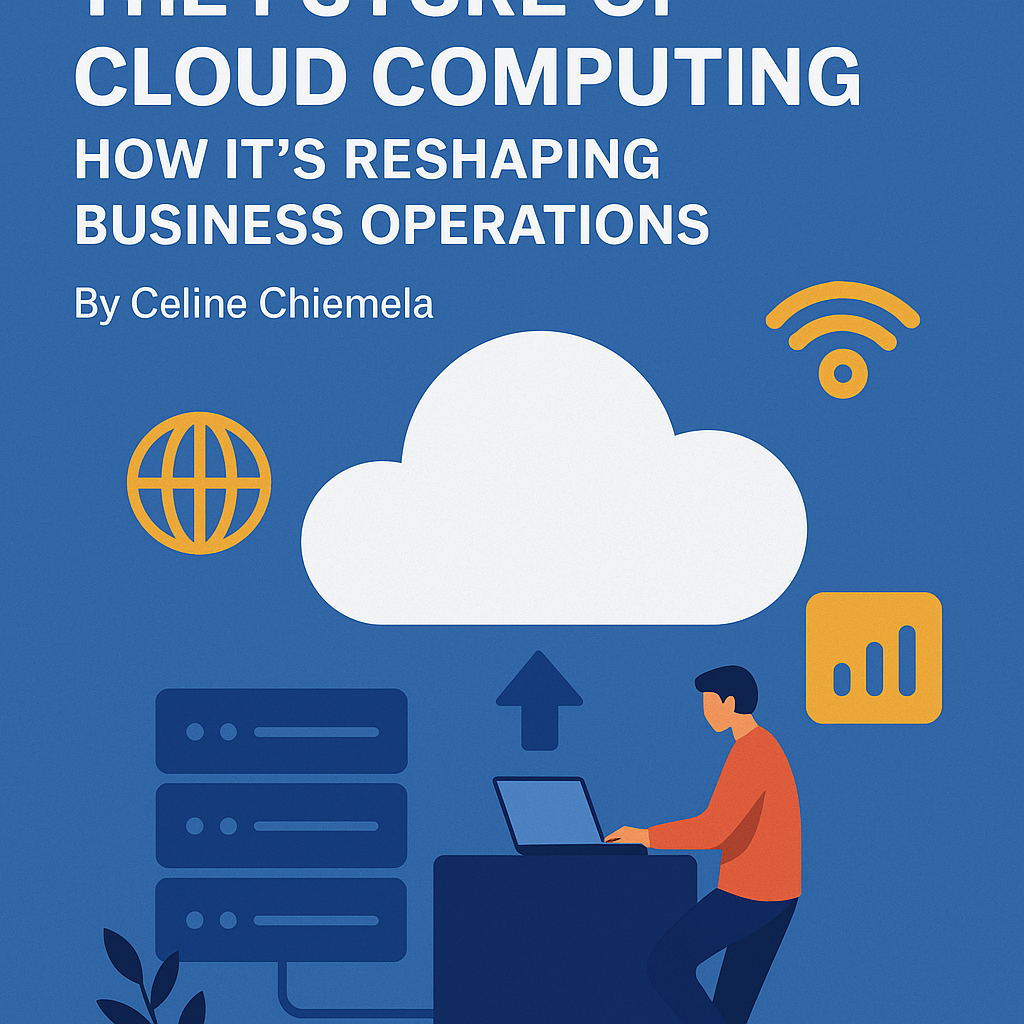The Future of Cloud Computing: How It’s Reshaping Business Operations in Nigeria and Beyond..
The Future of Cloud Computing: How It’s Reshaping Business Operations.
By Celine Chiemela.
Introduction: A Digital Evolution in the Clouds.
The digital landscape is rapidly evolving, and cloud computing is the engine powering this transformation. What began as a simple solution for remote data storage has now become the bedrock of innovation, agility, and global competitiveness for businesses across industries.
According to Statista, global spending on public cloud services is projected to reach over $675 billion by 2025. Cloud computing is no longer a luxury for the tech elite — it’s a necessity for any organization aiming to stay relevant in a fast-paced digital world.
This article explores how cloud computing is reshaping business operations, the trends defining its future, and what this shift means, particularly for businesses in developing economies like Nigeria.
Understanding Cloud Computing: What It Is and Why It Matters.
At its core, cloud computing is the delivery of IT resources over the internet. Instead of owning and maintaining physical data centers and servers, companies can rent computing power, storage, and services from cloud providers like:
Amazon Web Services (AWS).
Google Cloud Platform (GCP).
Microsoft Azure.
IBM Cloud.
Alibaba Cloud.
The model offers businesses flexibility, cost-efficiency, and real-time access to innovation.
️ Types of Cloud Deployment Models.
1. Public Cloud – Resources are owned and operated by a third-party provider. Ideal for cost-effective and scalable solutions.
2. Private Cloud – Exclusively used by one organization. Offers greater control and security.
3. Hybrid Cloud – A combination of public and private clouds, allowing businesses to manage sensitive data privately while using the public cloud for less-critical operations.
Cloud Service Models.
Infrastructure as a Service (IaaS): Rent computing infrastructure (servers, storage, networks). E.g., AWS EC2.
Platform as a Service (PaaS): Provides hardware and software tools for app development. E.g., Google App Engine.
Software as a Service (SaaS): Access software via the internet on a subscription basis. E.g., Microsoft 365, Salesforce.
Each model offers different levels of control, flexibility, and management – enabling businesses to choose what best fits their needs.
How Cloud Computing Is Reshaping Business Operations.
Let’s take a closer look at the transformational impact cloud computing has on modern business practices:
1. Enhanced Data Security.
One of the most pressing concerns for businesses is data security. Cloud providers invest heavily in cybersecurity, offering features like:
Multi-factor authentication (MFA).
End-to-end encryption.
Compliance with standards like ISO 27001, GDPR, HIPAA, and SOC .
Moreover, disaster recovery and automatic backups ensure data is never permanently lost.
2. Cost Optimization.
The traditional IT model involves large capital expenditure — purchasing hardware, maintaining infrastructure, and employing in-house IT teams. Cloud computing changes this to an OPEX-based model (operational expenses), where businesses:
Pay-as-you-go.
Scale up or down based on need.
Avoid overprovisioning resources.
This is particularly valuable for startups and small businesses, allowing them to launch with minimal upfront investment.
3. Improved Collaboration and Remote Work.
The post-COVID era has normalized remote and hybrid work models. Cloud computing supports this shift through:
Real-time document sharing (e.g., Google Workspace, Microsoft OneDrive).
Virtual meetings and video conferencing.
Centralized data access for globally distributed teams.
It’s now possible for a Nigerian-based design team to collaborate seamlessly with a developer in Canada — all via the cloud.
️ 4. Faster Product Development and Deployment.
Cloud platforms offer developers tools and environments to:
Build, test, and deploy applications rapidly.
Use containers (e.g., Docker, Kubernetes) for scalability.
Leverage serverless architectures to reduce backend complexity.
This agility translates into shorter time-to-market, which is crucial in competitive sectors like fintech and e-commerce.
5. Data Analytics and Business Intelligence.
Modern cloud solutions provide access to big data processing and analytics tools that help businesses:
Predict customer behavior.
Monitor operations in real-time.
Personalize marketing and sales strategies.
Tools like Google BigQuery, AWS Redshift, and Azure Synapse empower companies to turn data into actionable insights.
The Future of Cloud Computing: Trends to Watch.
The next decade of cloud computing will be shaped by emerging technologies and global needs. Here are the key trends every business leader should watch:
1. Multi-Cloud and Hybrid Cloud Strategies.
Businesses are increasingly avoiding dependency on a single cloud provider. A multi-cloud strategy spreads risk and improves performance by:
Using different providers for different services.
Ensuring backup and redundancy.
Optimizing cost and regional access.
Hybrid cloud environments allow organizations to maintain control over sensitive data while utilizing public clouds for general operations.
2. Edge Computing.
Edge computing brings computation closer to the source of data generation. Instead of sending data to a centralized cloud, processing happens at the edge — like on local servers, gateways, or IoT devices.
This is crucial for:
Smart cities.
Autonomous vehicles.
Industrial automation.
By reducing latency and bandwidth, edge computing enhances the responsiveness of applications that rely on real-time decision-making.
3. Artificial Intelligence and Machine Learning Integration.
Cloud platforms are integrating AI and ML to offer:
Predictive maintenance tools.
Automated customer service (chatbots).
Smart document processing.
Fraud detection systems.
For example, AWS SageMaker allows developers to build, train, and deploy ML models quickly, while Google Vertex AI makes AI available even to non-technical teams.
4. Serverless Computing.
Serverless architecture allows developers to focus solely on code. The cloud provider automatically handles the infrastructure, scaling, and maintenance.
Benefits include:
Faster development cycles.
Lower operational costs.
Reduced overhead.
Common platforms include AWS Lambda, Azure Functions, and Google Cloud Functions.
5. Sustainable and Green Cloud Computing.
With rising concerns over carbon emissions, providers are investing in:
Renewable energy-powered data centers.
Efficient cooling technologies.
Carbon footprint reporting tools.
Companies like Google Cloud and Microsoft Azure are working toward net-zero emissions, making sustainability a competitive advantage.
Cloud Computing in Africa: The Nigerian Perspective.
Africa is catching up with global tech trends, and Nigeria is at the forefront of cloud adoption in the region. While the opportunities are vast, challenges remain:
Key Opportunities:
Digital transformation of SMEs.
Cloud-based fintech platforms (e.g., Flutterwave, Paystack).
E-learning and EdTech innovations (e.g., uLesson, Edukoya).
Cloud-backed healthcare services.
Challenges:
Unreliable internet infrastructure.
High cost of mobile data.
Low awareness in rural communities.
Limited access to global payment platforms (e.g., PayPal).
Despite these hurdles, local startups and tech hubs are innovating around these constraints using affordable cloud solutions, open-source platforms, and government partnerships.
—
How Businesses Can Prepare for a Cloud-Powered Future.
To future-proof your business through cloud computing:
1. Audit Your IT Infrastructure.
Determine which operations can be migrated to the cloud.
2. Choose the Right Cloud Model.
Assess whether you need IaaS, PaaS, SaaS, or a combination.
3. Train Your Workforce.
Invest in cloud certifications (e.g., AWS Cloud Practitioner, Azure Fundamentals).
4. Implement a Cloud Security Strategy.
Use firewalls, encryption, and strong access controls.
5. Adopt an Agile Mindset.
Be ready to pivot and scale using real-time data and cloud-native tools.
Conclusion: Cloud as a Catalyst, Not Just a Tool
Cloud computing is not just a technical upgrade — it’s a strategic transformation tool. It enables businesses to:
Operate efficiently.
Reach global customers.
Innovate faster.
Respond to market changes with agility.
For Nigerian and African businesses, the cloud opens doors to global markets, cost-effective tools, and scalable platforms that would otherwise be inaccessible.
The future belongs to those who are cloud-ready.
Key Takeaways.
Cloud computing helps businesses cut costs, scale, and secure data more efficiently.
Emerging trends like edge computing, AI integration, and serverless architecture are redefining what the cloud can do.
Nigerian businesses face infrastructure hurdles but also enjoy massive potential through smart cloud adoption.
The key to success is strategic implementation, continuous learning, and agile execution.
Optional Hashtags for Visibility:
#CloudComputing.
#FutureOfWork.
#DigitalTransformation#NigeriaTech.
#TechInAfrica.
#BusinessInnovation.

